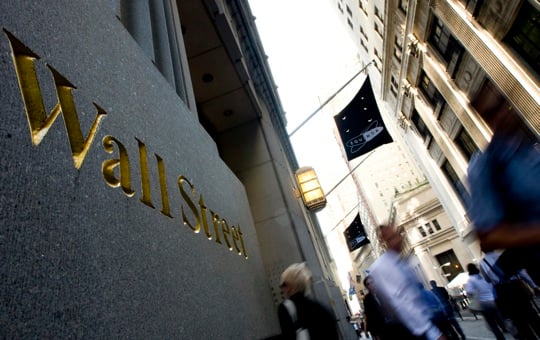Whopping bonuses, exorbitant salaries encouraged risk-taking, leverage; 'poachers better paid than the game-keepers'
Wall Street firms' soaring pay pushed traders to disregard risk and limited regulators' ability to lure top talent to police banks, according to a panel probing the origins of the financial crisis.
Stock-option bonuses motivated financial firms to use leverage to boost returns, and traders were given “aggressive incentives” to dissuade them from defecting, the Financial Crisis Inquiry Commission wrote in a 545-page book outlining its findings. Regulators had difficulty recruiting financial professionals, who could earn more working in the private sector, said the panel, which was appointed by Congress.
“The dangers of the new pay structures were clear, but senior executives believed they were powerless to change it,” the panel wrote. Former Citigroup Inc. Chief Executive Officer Sanford Weill told the commission, “If you look at the results of what happened on Wall Street, it became ‘Well, this one's doing it, so how can I not do it?'”
Regulators including the Federal Deposit Insurance Corp., the Federal Reserve and the Securities and Exchange Commission are drafting rules on pay meant to limit practices considered risky. The watchdogs found many banks were deficient in curtailing risk-taking that fueled the worst financial crisis since the Great Depression.
Pay at financial firms started to outpace other industries in 1980, when investment banks began converting from partnerships into publicly owned companies “trading with shareholders' money,” the FCIC said. Total compensation at U.S. banks and securities firms had climbed to $137 billion by 2007.
Clowns Running the Circus
Stock options and other incentives tied to a company's performance encouraged risk-taking because gains for the employees were much greater than the workers' potential losses, the FCIC said.
“These pay structures had the unintended consequence of creating incentives to increase both risk and leverage, which could lead to larger jumps in a company's stock price,” the FCIC said in its report.
Bear Stearns Cos. paid then-CEO James “Jimmy” Cayne and co-presidents Alan Schwartz and Warren Spector more than 10 times the amount the firm paid Chief Risk Officer Michael Alix in 2006, the commission said in its report. Bear Stearns collapsed in March 2008.
“This is like a continual process of, you know, high-skilled people versus high-skilled people, and the poachers are better paid than the game-keepers,” Lord Adair Turner, chairman of the U.K. Financial Services Authority, told the commission.
Ticked Off
The size of Wall Street salaries and bonuses sparked public anger in the wake of the 2008 financial crisis and subsequent government bailout of banks. Lawmakers drafting the Dodd-Frank Act responded by including limits on executive compensation. They stopped short of setting pay caps and instead called on regulators to write rules banning any pay structure that “encourages inappropriate risks.”
“As much as the government is making efforts on this, the companies have already started to better self-govern,” said Paul Sorbera, president of Alliance Consulting, a Wall Street executive-search firm. “If you have employees trading exotic derivatives or using a tremendous amount of balance sheet on risky products, they are looking at that a lot closer now.”
Goldman Sachs Group Inc., the most profitable firm in Wall Street history, paid 2009 bonuses for its 30 top executives entirely in stock. The firm said last month that it may give “key employees” bonuses that are tied to financial measures including revenue, net income and return on equity, a gauge of profitability.
Same-Old Same-Old?
Morgan Stanley said last week that members of its operating committee will have an average of more than 80 percent of their pay deferred. The average amount of all employees' pay that will be deferred is 60 percent, up from 40 percent for 2009.
The SEC said Jan. 25 that shareholders had the right to weigh in on pay for top executives. The measure will subject compensation plans to non-binding shareholder votes as often as once a year. The proposal is part of the agency's rulemaking under the Dodd-Frank Act.
“Many major financial institutions created asymmetric compensation packages that paid employees enormous sums for short-term success, even if these same decisions result in significant long-term losses or failure for investors and taxpayers,” SEC Chairman Mary Schapiro told the FCIC.
A study commissioned by the Council of Institutional Investors concluded that compensation practices at the six largest U.S. banks have “worsened” since the credit crisis as regulators encouraged higher base salaries and firms didn't properly tie bonuses to long-term performance.
A Bloomberg National Poll last month found that more than 70 percent of Americans wanted big bonuses banned for a year at Wall Street firms that took taxpayer money. Another 17 percent supported a 50 percent tax on bonuses exceeding $400,000.







